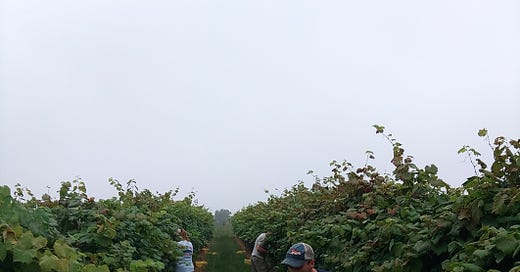2024 Harvest Update: Surry Vineyards | Dobson, North Carolina
Drought has yields down, but overall quality is up in 2024
I know very little about North Carolina wine or viticulture. I hope to fill that gap in my East Coast knowledge. For now, I lean on the folks down there who know much much more — people like Sarah Bowman, viticulture instructor at Surry Community College, who manages Surry Vineyards.
She provided this update on October 11:
All of our grapes have been harvested. Our final pick was the white variety petit manseng. We were hoping to make a late harvest, dessert-style wine with it since it has such thick skins, loose clusters, retains acidity and reaches high Brix; however, Mother Nature had a different plan, as she usually does. This variety is less prone to rot due to its cluster and skin characteristics, but after nearly six inches of rain (some just prior to Hurricane Helene, some directly from Helene, and then scattered strong thundershowers afterwards) the sugars became diluted, and more rot than we typically see in that variety set in. So, we picked it on Tuesday, October 8.
The star of this season is our albariño. It came in riper than usual, with more intense varietal character, and great acidity.
Yields overall for all varieties were lower than average this year. We had drought conditions from early June until mid-July, which really helped keep disease (mainly downy mildew) at a minimum, until the drought broke and all the rain we didn't get came all at once in late July. That rain was welcomed by many growers without irrigation or who had planted vines recently, or with mature vines that were starting to shut down from lack of water and fruit was starting to shrivel.
Generally, quality has been better than average this season, but quantity down from drought during berry formation when cells are dividing during the first stage of berry growth. Another reason why quantity was down was from less fruit remaining after bird, deer and groundhog feeding. I expected this to happen despite our efforts with nets, BirdGuard auditory deterrence, and a bird laser (yes we have a bird laser!). There's just less food for these animals available in the wild in a drought year, and none of these control methods are perfect.
I never really have much praise for our reds, with the exception of chambourcin and tannat. These are both varieties that seem to perform well even in less-than-ideal seasons. They consistently produce color, brix, retain enough acid, and tannat tons of tannin — all things that most of our other red varieties lack.
Sometimes petit verdot would be on this list, but this year it was not. It was lacking varietal intensity, was an acid bomb, and many of the clusters didn't even complete veraison fully. We used it in a blend with our equally disappointing merlot and cab franc, which lacked varietal character and acid, so the Petit verdot was a good partner with those. We actually picked the petit verdot and the cab franc in the absolute pouring rain with my Grape Harvest class. It was miserable. I have a good feeling about the tannat this year though. It's still on the skins and will be pressed by early next week.
North Carolina is a challenging region for a number of reasons — rain, humidity, summer heat, occasional droughts, late frosts, Pierce's Disease, downy mildew, bunch rots — but it's a great place to teach and experience grape growing and winemaking because if you can manage to grow grapes here you'll be well prepared for many of the challenges of southeastern U.S. viticulture.
However, because the challenges with growing grapes don't appear to be lessening any time soon, the college is thinking well into the future and we are planting the regions indigenous grape species, Vitis rotundifolia, commonly known as muscadines! My students and I are very excited to start working with muscadines, and it just didn't seem right to have a hands-on viticulture and enology program in the southeast that didn't include muscadine production.
I'm also excited to be planting norton this coming spring. One of the parents of norton is Vitis aestivalis, a grape species indigenous to the eastern U.S.
North Carolina has such a long and varied history of grapes and wine. There's a wide diversity of grapes and people growing and making wine out here! Our community in western North Carolina has contributed so much to the grape and wine industry, and the essence of what they are doing and creating has been inspiring. Friends and strangers have been coming together in the most beautiful ways in response to the horrific devastation of Hurricane Helene. There are certainly difficult days ahead for many as the impacts of the storm continue to be revealed. The future for many people, families, businesses, and communities is uncertain. But those mountains are home to so many, and a place of resilience and a place that many people love and seek out for their own healing. It's going to take time, but what stays and goes will always be a part of our history.
The Cork Report is reader-supported. Please consider upgrading to a paid subscription.






